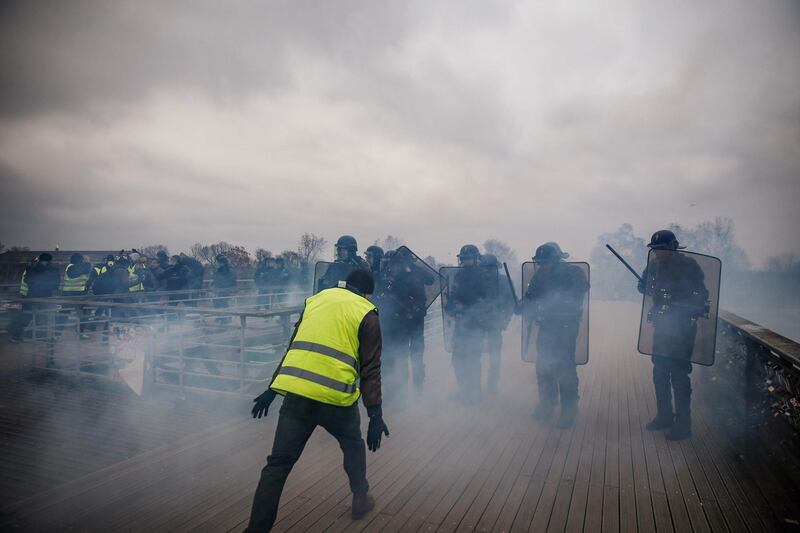Embattled French President Emmanuel Macron has declared the gloves are off against anti-government protests that have immobilised the main cities for an eighth consecutive weekend of violent demonstrations.
Rather than giving in to the gilets jaunes (or "yellow vests") movement, aides to Mr Macron are planning a reshuffle of his administration after introducing new measures that enraged the low-paid workers rallied behind the symbolic yellow reflective jackets.
French authorities struggled to maintain order on Saturday as 50,000 demonstrators took to the streets in Paris, Bordeaux, Toulouse, Rennes and Marseille to protest diesel taxes and soaring living costs. Protestors torched cars near the Arc de Triomphe and used a truck to force their way into a government ministry hosting Mr Macron’s spokesman, Benjamin Griveaux.
The building’s façade was defaced as protesters stormed the courtyard and smashed up cars. “It wasn’t me who was attacked,” Mr Griveaux, who was evacuated from the building, said. “It was the Republic. Those who insult, attack, vandalize, plunder, burn, steal have no place in the Republic. They must be identified, prosecuted and heavily condemned. "
His words were echoed by Mr Macron who tweeted: “Once again, the Republic was attacked with extreme violence - its guardians, its representatives, its symbols. Those who committed these acts forget the spirit of our civic pact. Justice will be done.”
Une fois encore, une extrême violence est venue attaquer la République - ses gardiens, ses représentants, ses symboles. Ceux qui commettent ces actes oublient le cœur de notre pacte civique. Justice sera faite. Chacun doit se ressaisir pour faire advenir le débat et le dialogue.
— Emmanuel Macron (@EmmanuelMacron) January 5, 2019
According to figures released by the ministry of interior on Monday, 345 people were stopped by the authorities over the weekend, 281 of which were held in custody. Among them is a well-known boxer referred to as Christopher D. by French media, who stands accused of punching a police officer.
Le @PrefPolice a saisi le procureur de la République de Paris.
— Christophe Castaner (@CCastaner) January 5, 2019
Pleine confiance en notre justice devant laquelle il devra rendre compte de cette attaque aussi lâche qu'intolérable.
Gratitude à ces gendarmes mobiles pour leur sang-froid exemplaire.https://t.co/y6HXgyKnCL
Mr Macron has been criticized for the authorities’ brutal crackdown on protesters as new images of police violence emerged.
‘French police in cold blood. Very cold.’#GiletsJaunes #Yellowvests pic.twitter.com/eLvIzSUDoS
— nonouzi (@Gerrrty) January 6, 2019
Despite the movement not losing steam over the Christmas holidays, Mr Macron announced new measures that angered protestors, including stricter rules for unemployment benefits and the cutback of thousands of public sector jobs.
The executive is also not backing down on its environmental and energetic reforms. As part of its “multi-year energy program” (PPE), the government vowed to reduce the share of nuclear in our energy mix to 50 percent by 2035 rather than 2025, but did not agree to scrap them entirely.
Similarly, the controversial fuel tax that ignited the protests in November was postponed for one year in December but was not repealed.
In the attempt to appease protesters, Mr Macron made a 10 billion euros ($11.39 billion) concession – which includes tax cuts for pensioners and wage rises for the poorest workers.
But his efforts have so far fallen short, with critics expressing fears that the fuel tax hikes may resurface once the year is over.
This will be one of the issues discussed during the national debate scheduled to take place throughout the month of January, which will see representatives of the government and syndicates come together to discuss fiscal measures as and ways to implement the transition towards clean energy.
In the meantime, Mr Macron is in damage control mode as he seeks to recruit new collaborators who are experienced in dealing with political crisis. Pierre Olivier, a candidate for the position of cabinet director, was dismissed due to his lack of experience managing crisis as well as his insufficient familiarity with the media, French radio station Europe 1 reported.
Others, like communications director Sylvain Fort, are jumping the sinking ship. Mr Fort, who is one of the president’s closest collaborators, announced that he will quit his post at the end of the month, citing the desire to spend more time with his family.
Last summer, the celebrity environmentalist and former TV presenter Nicolas Hulot from the post of environment minister resigned live on a radio show, a move that marked the start of the exodus.
Mr Macron’s popularity hit a new record-low last week, with three quarters of French people saying they are unhappy with the way the president is running the country, according to a survey commissioned by the Figaro newspaper.
The gilets jaunes movement began in November, when thousands of people across France spontaneously organized to block roads and roundabouts dressed in their yellow motorist's vests. The protests against Macron, originally sparked by fuel tax hikes, have since evolved into a generalized cry of grievance embraced by all disgruntled segments of French society.






